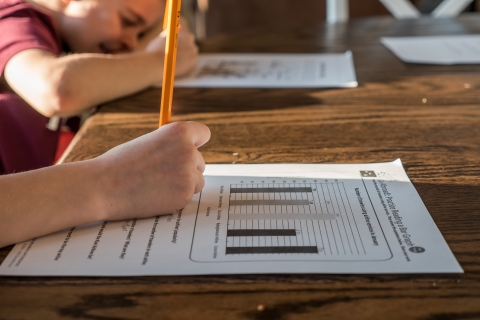

A new study found that parents of young children worried that once lockdown ends, they might forget some of the insights that came out of spending so much time with their children
10 July 2020
8 min read
Parents of young children went from highly stressed at the start of lockdown to wondering whether they will miss parts of the experience when this extraordinary period eventually ends.
According to new small-scale study by Dr Alessandra Fasulo, at the University of Portsmouth, parents of young children worried that once lockdown was over, they might forget some of the insights that came out of spending so much time with their children.
They were also surprised how much they learned about their own children.
Dr Fasulo studied four families home schooling their young children over three months, from March to June. All the parents were employed and working from home, and the children were all aged under eight.
The families started lockdown trying to follow strict routines, including pretending home was school, or even having their children line up at the start of each ‘lesson’.
All eventually found that mimicking normal life was not sustainable.
Dr Fasulo said: “These parents initially imposed strict schedules that imitated normal life, with set hours for learning, eating and play. There was a sort of explosion at the beginning when parents were realising they couldn’t work when they wanted to and they were stressed about not doing home schooling ‘right’.
There was a sort of explosion at the beginning when parents were realising they couldn’t work when they wanted to and they were stressed about not doing home schooling ‘right’.
Dr Alessandra Fasulo , Senior Lecturer
“But this anxiety didn’t work for parents or for their children, and eventually there was a letting go of the rigid boundaries.”
She also found parents and children became comfortable working on their own things alongside one another.
“It became clear, over the course of many weeks, that even very young children need concentration and calm and don’t want endless stimulation or scheduled teaching,” she said.
“Parents also found they discovered new things about their children – how they learn and play – because they were seeing their children all day, rather than only in the evenings and weekends.
“Home schooling and being confined all day, every day demanded parents make changes, but once they stopped trying to mimic the tight schedules of normal life, they found a sense of wonder and fun they’d not anticipated.”
Dr Fasulo interviewed the parents numerous times over the first three months of lockdown. The parents acknowledged that they were relatively fortunate, as they all had a partner to rely on and could work from home, Despite this, some days were still overwhelming. They also reported how they could see that children missed their social life. However, both parents and children creatively adjusted to the new situation after the first days, and the lockdown turned out – as one mother said towards the end described as a ‘once in a lifetime opportunity’. She said: “What will remain of all this? Will we go back to how it all was before, or will we keep some of the good things?”
Home schooling and being confined all day, every day demanded parents make changes, but once they stopped trying to mimic the tight schedules of normal life, they found a sense of wonder and fun they’d not anticipated.
Dr Alessandra Fasulo, Senior Lecturer
Another parent described learning to be with their children all day everyday as “a sort of privilege”.
He said: “I see the delight in my daughter’s face when she learns something new. I see how hard she tries to learn difficult things, such as fractions.”
He said that once he gave up trying to schedule everything and stopped worrying how much was being achieved, he developed a sense of calm: “There’s less pushing through and more ease.”
Another parent said she hoped she’d remember to sometimes stay in the moment with her children, rather than always be doing something.
One parent expressed her surprise that her son took great pleasure in helping with household chores, which he had never been involved with before lockdown, because his parents did them while he was asleep.
The parents also found their children often followed them around the home, not to engage directly, but to be nearby, doing their own things, while their parents worked.
“There was pleasure in simply being together,” Dr Fasulo said.
A youtube video of some of Dr Fasulo’s interviews with parents can be found here.
